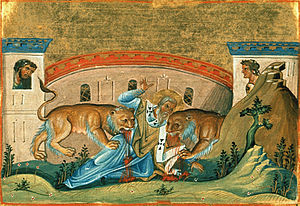Saint Ignatius of Antioch (+107) joyfully ‘went to the lions’, as the saying goes, meeting his martyrdom in the Coliseum, perhaps less than a decade after the death of the last Apostle, John the Evangelist. Ignatius was the epi-scopos – literally the ‘overseer’ – of the ancient diocese of Antioch, where the ‘disciples were first called Christians’, and where Saint Peter was first a bishop, before going to Rome.
I am writing to all the churches to let it be known that I will gladly die for God if only you do not stand in my way. I plead with you: show me no untimely kindness. Let me be food for the wild beasts, for they are my way to God. I am God’s wheat and shall be ground by their teeth so that I may become Christ’s pure bread. Pray to Christ for me that the animals will be the means of making me a sacrificial victim for God.
On the long and difficult route, bound in chains, Ignatius managed somehow to pen seven letters to seven communities of early Christians, which offer not only a store of spiritual depth, wisdom and courage, but offer some of the most clear and direct evidence of the Catholic Church’s structure from the very beginning, right after the time of Christ, replete with bishops, priests, dioceses, and irrefutable belief in the Real Presence.
Here is Ignatius in his letter to the Ephesians, desiring the Eucharist as the medicine of immortality, the antidote against death, and everlasting life in Jesus Christ and to the Romans, quoted in today’s Office of Readings, wherein he prays that he no longer take pleasure in perishable food or in the delights of this world. I want only God’s bread, which is the flesh of Jesus Christ, formed of the seed of David, and for drink I crave his blood, which is love that cannot perish, all of which follows upon the clear teaching of Christ Himself, as recounted in the Bread of Life discourse in chapter six of Saint John’s Gospel.
Small wonder, then, that Saint Cardinal Newman, in his own vain attempt to find an Anglican ‘via media’, a kind of Protestant middle ground somewhere in the early past, quipped that to ‘delve into history is to cease to be a Protestant’. There never was a simple sort of Gospel-only church, or, rather, community, with just the Bible and a lay-pastor. From the very beginning, there was the One, Holy, Catholic and Apostolic Church, centred in Rome under Saint Peter, with all the sacraments and all the Liturgy and all the means of holiness and truth, even if obscured at times.
This is also the anniversary, if you will of Trudeau’s legalization of marijuana, with Canada thereby becoming the second sovereign nation to legalize the green weed (Uruguay just beat us to the punch). Peruse, if you will, something I have an article in Crisis this morning on the moral difference between alcoholic beverages, permitted in our Catholic faith, and recreational drugs, which are intrinsically immoral. I have heard that marijuana also saps and weakens one’s will, the opposite of the fortitude of Ignatius; there is reason those addicted have acquired the epithet dopeheads.
On that note, feel free to peruse something I wrote last year for Crisis, which I have re-posted here on Catholic Insight. Comments are always welcome.











